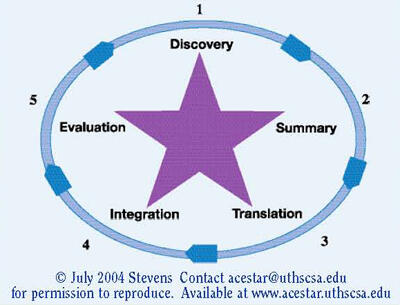Introduction
- Evidence-based projects improve nurses’ practical skills.
- They integrate theoretical knowledge into health care.
- The discussed issue is vaccinations.
- Vaccines are recommended for children (Alexander, Lacy, Myers, & Lantos, 2016).
- Some parents are afraid of vaccines.
- Education about vaccines’ benefits is vital.
Importance of Evidence-Based Projects
- Master’s degrees focus on specific skills.
- Evidence-based projects implement theory into practice.
- Nurses improve ways of knowledge implementation.
- Projects concern real problems of communities.
- Nurses utilize learnings for contemporary issues.
- Such projects can benefit current providers.
Model
- ACE Star Model of the Cycle of Knowledge Transformation
- 5 points (Figure 1):
- Discovery – Data about problems is collected.
- Evidence Summary – Pertinent information is summarized.
- Translation – Knowledge is systematized for the utilization.
- Integration – Information is adopted into practice.
- Evaluation – The project’s results are assessed (Correa-de-Araujo, 2016).

Specialty Track
- Chosen Specialty: Family Nurse Practitioner (FNP).
- FNPs have an extensive knowledge base.
- They work with a variety of patients.
- The occupation requires great interpersonal skills.
- They discuss the public’s contemporary concerns.
- FNPs focus on patient health education.
Area of Interest: What is Known
- Vaccination was introduced in the 18th century.
- Immunization offers many benefits for people.
- Many diseases were eliminated by vaccines.
- Vaccines protect people from infections.
- Among the most widespread healthcare practices (Doherty, Buchy, Standaert, Giaquinto, & Prado-Cohrs, 2016).
Area of Interest: Common Themes
- Vaccination always was a controversial subject
- Many campaigns call to make immunizations mandatory
- In the US, vaccines are recommended
- Immunization can start at birth
- The quality of vaccines continues to rise.
- Unvaccinated people can endanger others (Doherty et al., 2016; Fadda, Depping, & Schulz, 2015).
Common Issue
- Parents can refuse vaccination for children
- Basis: religion, fear of adverse effects
- Unvaccinated children are exposed to viruses
- Some parents are misinformed about immunization
- They believe that vaccines cause illnesses
- The coverage of some diseases decreases (Alexander et al., 2016; Fadda et al., 2015).
Recommendation for Positive Change
- Educational programs for parents and caretakers
- Recognition of patients’ concerns and thinking
- Focus on the advantages of immunization
- Refutation of disproven or unjustified beliefs
- Parents’ positive reinforcement and psychological empowerment
- Materials with simple content and recommendations (Alexander et al., 2016; Fadda et al., 2015).
Internal Factors Affecting Change
- Added research of misinterpretation is needed
- Patients may not participate in studies
- Parents’ competence is difficult to assess (Fadda et al., 2015)
- Lack of resources for the program
- Healthcare providers may have other priorities
- Finances, staff, and time are needed (Alexander et al., 2016).
External Factors Affecting Change
- Some organizations oppose vaccines actively
- Their participation staggers research and implementation.
- Open dialogue is necessary to proceed.
- Parents’ literacy levels affect their understanding.
- Low reading comprehension negatively affects education
- Patient’s social barriers disrupt learning (Fadda et al., 2015).
AACN Master’s Essentials
- “Essential I: Background for Practice from Sciences” (AACN, 2011, p. 4)
- Examination of the present research is vital.
- Vaccination studies help develop educational plans.
- “Essential VIII: Clinical Prevention and Population Health” (AACN, 2011, p. 5)
- Delivery of information to impacted populations.
- Prevention of future diseases through vaccination.
Conclusion
- Immunization is vital in health care.
- Vaccines eliminated and suppressed many diseases.
- Children’s vaccination schedule starts at birth.
- Some parents refuse immunization for children.
- Young patients are exposed to infections.
- Parents’ education can increase their understanding.
References
Alexander, K., Lacy, T. A., Myers, A. L., & Lantos, J. D. (2016). Should pediatric practices have policies to not care for children with vaccine-hesitant parents? Pediatrics, 138(4), e20161597.
American Association of Colleges of Nursing [AACN]. (2011). The essentials of master’s education in nursing. Web.
Correa-de-Araujo, R. (2016). Evidence-based practice in the United States: Challenges, progress, and future directions. Health Care for Women International, 37(1), 2-22.
Doherty, M., Buchy, P., Standaert, B., Giaquinto, C., & Prado-Cohrs, D. (2016). Vaccine impact: Benefits for human health. Vaccine, 34(52), 6707-6714.
Fadda, M., Depping, M. K., & Schulz, P. J. (2015). Addressing issues of vaccination literacy and psychological empowerment in the measles-mumps-rubella (MMR) vaccination decision-making: A qualitative study. BMC Public Health, 15(1), 836.
Summer Institute of Evidence-Based Practice. (2008). Ace Star Model of the Cycle of Knowledge Transformation. Web.